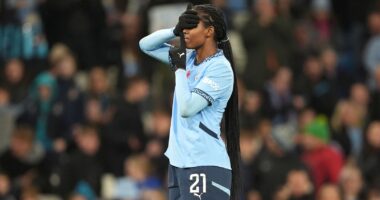A trailblazer in her own right, the Director General of the World Trade Organisation (WTO), Ngozi Okonjo-Iweala is a woman worthy of emulation. As she turned 70 last Thursday, June 13, Vanessa Obioha profiles her life, career and numerous achievements “Energetic” is a word frequently used to describe Ngozi Okonjo-Iweala, the Director General of the World Trade Organisation (WTO). In a 2015 interview, her third child, songwriter and singer Okechukwu Iweala, told journalists that his mother is the most hardworking woman he has ever known. “People don’t know that my mum used to work 20 hours literally every day. It never changed; whether she is in Washington or Abuja. People don’t see this but we see it live and direct.” At the WTO, her colleagues often marvelled at her remarkable vigour, frequently asking, “How come you are so energetic and eager?” she revealed during a fireside chat last April at the Centre for Global Development, where she is a non-resident fellow. Having turned 70 on Thursday, June 13, it is understandable why many admire her zest. Few of her peers can boast such stamina at that age. Okonjo-Iweala’s spirited personality stems from the passion and values instilled in her by her parents. Born in 1954 in Ogwashi-Ukwu to academic parents, she was taught early on that education is a privilege, not a right, and it should be used to enrich others rather than oneself. “This has guided my whole life so I’ve always been looking to do something in public service, something where you give back,” she told David de Ferranti whose latest book ‘Reformers in International Development: Five Remarkable Lives’ chronicles Okonjo-Iweala’s transformative life and career from childhood to present day. The value of education was further instilled by her father. She recalled a childhood occasion when he denied her a holiday trip with neighbours, believing the money for her flight fare would be better spent on other children’s tuition. This lesson left a lasting impression on the young Okonjo-Iweala. The global leader seemingly had a close relationship with her late father, Chukwuka Okonjo. He was a retired professor of economics and a traditional Igbo ruler of Ogwashi-Uku in Delta State. “I’m told I’m like my father, and he was the most wonderful man. But I think he was gentler than me,” she once quoted of her relationship with her father. According to her, he expected a lot from her and her siblings — she has five brothers and a sister — particularly she and her sister. “My parents were academics, they both had PhDs so my father felt you should have a PhD, you should write books, you should get married, you should have kids, you should publish, really you could have it all but he never forced me to do anything.” With this mindset, Okonjo-Iweala pursued her education and career with determination and resilience, breaking stereotypes and inspiring younger women. After completing primary education in Nigeria, Okonjo-Iweala graduated from Harvard University with a Bachelor’s degree in Economics and earned a Ph.D. in Regional Economics and Development from the Massachusetts Institute of Technology (MIT). She began her career at the World Bank, where she worked for over 25 years, eventually rising to the position of Vice President and Corporate Secretary. During her tenure, she played a key role in shaping the institution’s agenda and priorities, focusing on poverty reduction, sustainable development, and global health. Known as a tough negotiator, President Olusegun Obasanjo sought her expertise during his democratic rule to help reform the Nigerian economy. Thus, Okonjo-Iweala became the first Nigerian female to serve as both Finance Minister and later as Foreign Minister from 2003 to 2006. She implemented significant economic reforms aimed at stabilising the economy, reducing corruption, and promoting fiscal transparency. One of her significant achievements during the Obasanjo era was leading negotiations with the Paris Club, an assembly of the world’s most developed nations. This resulted in the restructuring of $30 billion of Nigeria’s external debt and the outright cancellation of $18 billion. The negotiation took Okonjo-Iweala 18 months of hard work. While many hailed her ability to secure such significant debt relief, Okonjo-Iweala attributed her success to thorough preparation and the importance of research. In 2006, she also boosted Nigeria’s reputation by securing its first-ever sovereign credit rating of BB minus from Fitch Ratings and Standard & Poor’s and helped create the Debt Management Office. Keen on government transparency, she introduced the practice of publishing the federal, state, and local government shares of revenue from the country’s federal account. After a brief stint at the World Bank in 2006, Okonjo-Iweala would come back to Nigeria to serve again as Nigeria’s Finance Minister and Coordinating Minister for the Economy under Goodluck Jonathan’s presidency. This second tenure was challenging, as she focused on combating financial corruption, which ruffled some feathers. She initiated the implementation of the Government Integrated Financial Management System (GIFMS), the Integrated Personnel and Payroll Management System (IPPMS), and the Treasury Single Account (TSA). The IPPMS was particularly effective in addressing the issue of phantom workers in the government. Her financial management reforms drew ire from primarily oil marketers who were allegedly siphoning money from oil accounts. “We tried to clean that out and that’s when I got into trouble because if you are fighting corruption or corrupt people, they are not just going to stand still,” she told Ferranti. Okonjo-Iweala’s mother, 83 at the time, was kidnapped and held for five days. Acknowledging the role President Jonathan played in securing her mother’s release, she admitted that it was a challenging period for her that made her question if her work was worth someone’s life. “I felt very guilty at the time but I’m happy that it ended well. My mother is still alive today and she just turned 94 last month (March). She doesn’t like talking about it (the abduction). If you mention it, she starts shaking because the experience was horrific.” In 2021, Okonjo-Iweala made history as the first woman and African to become the Director-General of WTO. Her appointment was widely celebrated, drawing attention to her unique style. Despite the corporate environment where suits are customary, Okonjo-Iweala maintained her preference for Ankara outfits, often accessorised with her signature gele and beaded necklace. “As I started getting up in leadership, one thing I noticed was as a woman leader making your way, people look at your appearance so much,” she once said in an interview. “They don’t look at men as much, they can easily appear in their suit and tie or agbada and so on. They don’t comment on their attire, but a woman is put up for scrutiny.” By opting for African wear over a formal business look, Okonjo-Iweala embraces her Nigerian heritage, but more importantly, it helps to “stop people from wondering what I am going to look like.” Her choice carries symbolic weight, evident in the global #BeLikeNgoziChallenge on social media, where people, including young girls, women and even men, participated. Her consistent fashion statement challenges stereotypes about beauty, professionalism and sophistication, asserting that these qualities can be embodied just as effectively through African attire, hairstyles and accessories. Beyond the halls of financial institutions, Okonjo-Iweala has played significant roles in global health. From efforts to combating HIV/AIDS to chairing the board of the Global Alliance for Vaccinations and Immunization (Gavi) where through the COVAX facility, she campaigned for equitable and affordable access to COVID-19 vaccines. As a prominent female leader in both the public and private sectors, Okonjo-Iweala has been a staunch advocate for women’s empowerment and gender equality. She has consistently called for increased representation of women in leadership roles and advocated for greater investment in education and economic opportunities for women and girls. During her tenure as Nigeria’s Finance Minister, she initiated the Growing Women and Girls programme. Her commitment to these causes is evident in her engagements, such as co-hosting the Women in Leadership event with the Duchess of Sussex, Meghan Markle, during her visit to Nigeria last May, and her efforts at the WTO where she champions gender inclusion. She disclosed to Ferranti that she insisted on having an equal number of deputy director generals upon joining the WTO, and has recruited a gender and diversity advisor for the organisation. She is currently focused on initiatives to empower women in trade. “We are working very hard on how to break down the supply side of barriers in trade, particularly in digital trade and digitally delivered services trade such as streaming, entertainment, accountancy services and education online as well as just selling online. It’s the fastest growing segment of trade so how do we encourage it.” She further revealed that the WTO is raising a $50 million fund to support women in digital trade and “it’s been kicked off by the UAE with a $5 million contribution.” With her numerous awards and recognitions, Okonjo-Iweala is the ideal female leader for every young girl, yet her childhood was marked by challenges. During the Nigerian Civil War, when her father served as a brigadier in the Biafran army, it was Okonjo-Iweala who helped her mother, Kamene, to cook for the troops. “Basically, we ran from place to place and my parents lost everything, everything they owned—all their household belongings, all their savings,” she told F&D in an interview. “I spent some time in Port Harcourt with my mother, and we would cook for the armed forces. We spent all day doing that. That was our way of contributing. We had no meat for three years. We couldn’t go to school until the last year of the war when my mother set up a little school.” Another harrowing experience in Okonjo-Iweala’s life during that period was when she walked 10 kilometres to a clinic to save her sister who was suffering from malaria. Despite encountering a large crowd seeking medical assistance, the determined Okonjo-Iweala crawled through their legs with her sister on her back and climbed through a window to reach the doctor. “I knew if she didn’t get help she’d die,” she recalled. Fortunately, her sister received the necessary medical attention and recovered. Widely celebrated by many, Okonjo-Iweala’s greatest support comes from her family. She is married to a neurosurgeon from Abia State, Ikemba Iweala, and is blessed with four children and grandchildren. Although she is recognised as a trailblazer in various fields, Okonjo-Iweala’s ultimate aspiration is for the day when gender milestones like “first woman” become irrelevant. “I just want that to go away,” she expressed. “I don’t derive tremendous pleasure from being the first woman to do this because I don’t think it should be that way. My dream is to see many more women up there.”
Subscribe
Login
0 Comments





